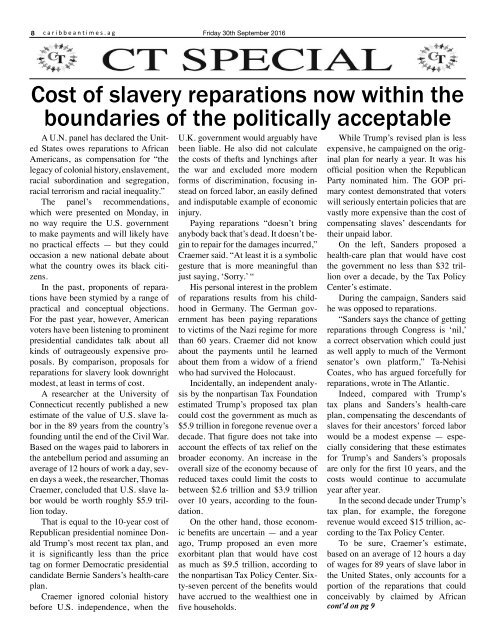Caribbean Times 5th Issue - Friday 30th September 2016
Caribbean Times 5th Issue - Friday 30th September 2016
Caribbean Times 5th Issue - Friday 30th September 2016
Create successful ePaper yourself
Turn your PDF publications into a flip-book with our unique Google optimized e-Paper software.
8 c a r i b b e a n t i m e s . a g<br />
<strong>Friday</strong> <strong>30th</strong> <strong>September</strong> <strong>2016</strong><br />
Cost of slavery reparations now within the<br />
boundaries of the politically acceptable<br />
A U.N. panel has declared the United<br />
States owes reparations to African<br />
Americans, as compensation for “the<br />
legacy of colonial history, enslavement,<br />
racial subordination and segregation,<br />
racial terrorism and racial inequality.”<br />
The panel’s recommendations,<br />
which were presented on Monday, in<br />
no way require the U.S. government<br />
to make payments and will likely have<br />
no practical effects — but they could<br />
occasion a new national debate about<br />
what the country owes its black citizens.<br />
In the past, proponents of reparations<br />
have been stymied by a range of<br />
practical and conceptual objections.<br />
For the past year, however, American<br />
voters have been listening to prominent<br />
presidential candidates talk about all<br />
kinds of outrageously expensive proposals.<br />
By comparison, proposals for<br />
reparations for slavery look downright<br />
modest, at least in terms of cost.<br />
A researcher at the University of<br />
Connecticut recently published a new<br />
estimate of the value of U.S. slave labor<br />
in the 89 years from the country’s<br />
founding until the end of the Civil War.<br />
Based on the wages paid to laborers in<br />
the antebellum period and assuming an<br />
average of 12 hours of work a day, seven<br />
days a week, the researcher, Thomas<br />
Craemer, concluded that U.S. slave labor<br />
would be worth roughly $5.9 trillion<br />
today.<br />
That is equal to the 10-year cost of<br />
Republican presidential nominee Donald<br />
Trump’s most recent tax plan, and<br />
it is significantly less than the price<br />
tag on former Democratic presidential<br />
candidate Bernie Sanders’s health-care<br />
plan.<br />
Craemer ignored colonial history<br />
before U.S. independence, when the<br />
U.K. government would arguably have<br />
been liable. He also did not calculate<br />
the costs of thefts and lynchings after<br />
the war and excluded more modern<br />
forms of discrimination, focusing instead<br />
on forced labor, an easily defined<br />
and indisputable example of economic<br />
injury.<br />
Paying reparations “doesn’t bring<br />
anybody back that’s dead. It doesn’t begin<br />
to repair for the damages incurred,”<br />
Craemer said. “At least it is a symbolic<br />
gesture that is more meaningful than<br />
just saying, ‘Sorry.’ “<br />
His personal interest in the problem<br />
of reparations results from his childhood<br />
in Germany. The German government<br />
has been paying reparations<br />
to victims of the Nazi regime for more<br />
than 60 years. Craemer did not know<br />
about the payments until he learned<br />
about them from a widow of a friend<br />
who had survived the Holocaust.<br />
Incidentally, an independent analysis<br />
by the nonpartisan Tax Foundation<br />
estimated Trump’s proposed tax plan<br />
could cost the government as much as<br />
$5.9 trillion in foregone revenue over a<br />
decade. That figure does not take into<br />
account the effects of tax relief on the<br />
broader economy. An increase in the<br />
overall size of the economy because of<br />
reduced taxes could limit the costs to<br />
between $2.6 trillion and $3.9 trillion<br />
over 10 years, according to the foundation.<br />
On the other hand, those economic<br />
benefits are uncertain — and a year<br />
ago, Trump proposed an even more<br />
exorbitant plan that would have cost<br />
as much as $9.5 trillion, according to<br />
the nonpartisan Tax Policy Center. Sixty-seven<br />
percent of the benefits would<br />
have accrued to the wealthiest one in<br />
five households.<br />
While Trump’s revised plan is less<br />
expensive, he campaigned on the original<br />
plan for nearly a year. It was his<br />
official position when the Republican<br />
Party nominated him. The GOP primary<br />
contest demonstrated that voters<br />
will seriously entertain policies that are<br />
vastly more expensive than the cost of<br />
compensating slaves’ descendants for<br />
their unpaid labor.<br />
On the left, Sanders proposed a<br />
health-care plan that would have cost<br />
the government no less than $32 trillion<br />
over a decade, by the Tax Policy<br />
Center’s estimate.<br />
During the campaign, Sanders said<br />
he was opposed to reparations.<br />
“Sanders says the chance of getting<br />
reparations through Congress is ‘nil,’<br />
a correct observation which could just<br />
as well apply to much of the Vermont<br />
senator’s own platform,” Ta-Nehisi<br />
Coates, who has argued forcefully for<br />
reparations, wrote in The Atlantic.<br />
Indeed, compared with Trump’s<br />
tax plans and Sanders’s health-care<br />
plan, compensating the descendants of<br />
slaves for their ancestors’ forced labor<br />
would be a modest expense — especially<br />
considering that these estimates<br />
for Trump’s and Sanders’s proposals<br />
are only for the first 10 years, and the<br />
costs would continue to accumulate<br />
year after year.<br />
In the second decade under Trump’s<br />
tax plan, for example, the foregone<br />
revenue would exceed $15 trillion, according<br />
to the Tax Policy Center.<br />
To be sure, Craemer’s estimate,<br />
based on an average of 12 hours a day<br />
of wages for 89 years of slave labor in<br />
the United States, only accounts for a<br />
portion of the reparations that could<br />
conceivably by claimed by African<br />
cont’d on pg 9

















